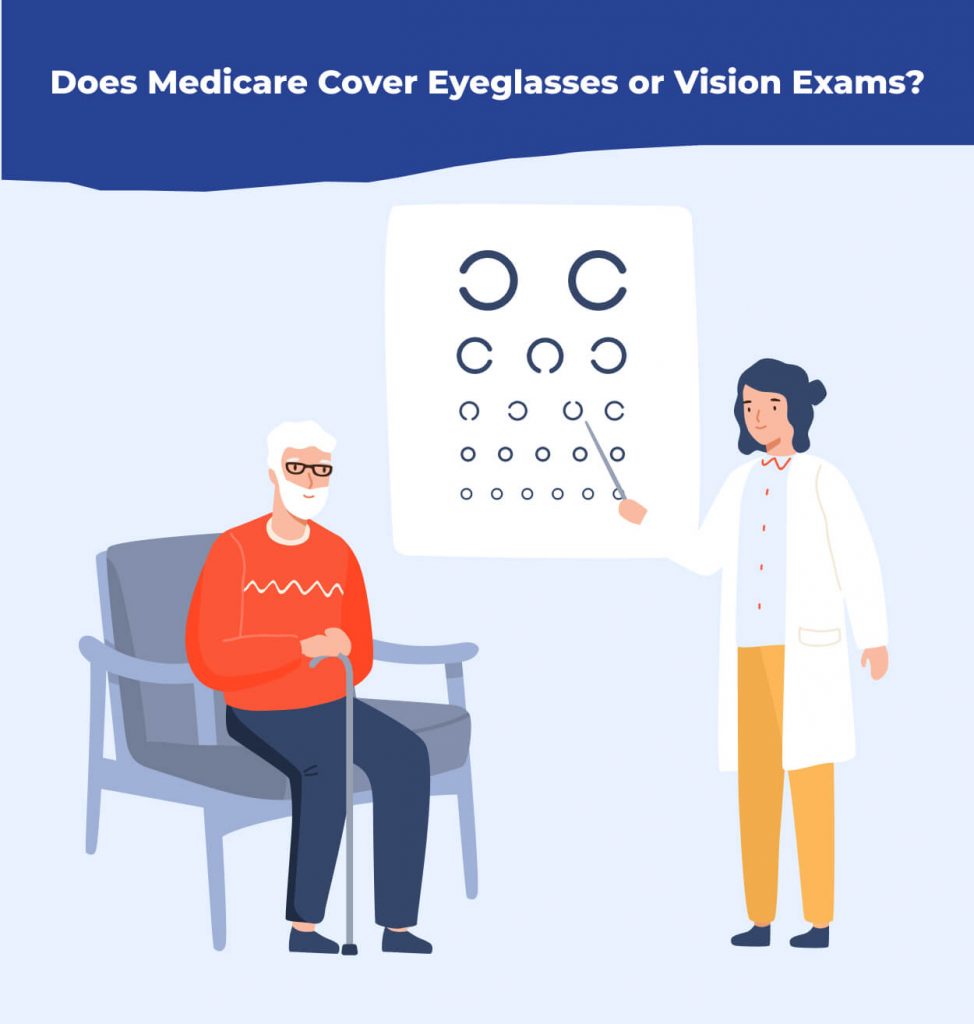
Medicare covers vision services if it’s deemed medically necessary. Many beneficiaries’ vision is medically essential, but Medicare doesn’t see eye care in that light.
Medicare coverage for eye exams, eyeglasses, and vision care
Original Medicare won’t cover routine eye examinations, treatments, or glasses unless tied to a medical condition.
Medicare Part B will cover routine preventative and diagnostic eye examinations for diabetes, glaucoma, macular degeneration, and cataracts.
What vision conditions does Medicare cover?
- Diabetes
- Glaucoma
- Macular Degeneration
- Cataracts
Diabetes
Diabetic retinopathy damages the retina in the back of the eye and is caused by diabetes mellitus.
It affects 80% of people that have had diabetes longer than 20 years and is one of the leading causes of blindness in developed countries.
Medicare will cover diabetic retinopathy once a year for beneficiaries that have diabetes.
Glaucoma
Glaucoma is a group of eye diseases that causes vision loss due to damaging the optic nerves. Beneficiaries with a high risk of glaucoma will receive a glaucoma test every 12 months.
Macular Degeneration
Macular degeneration is an eye condition that can cause blurry or no vision in the center of the visual field. At first, there are no symptoms, but beneficiaries report worsening vision in one or both eyes as the disease continues.
While macular degeneration will not lead to being completely blind, it can affect your ability to complete simple everyday tasks. Medicare will cover diagnostic testing for both wet and dry macular degeneration.
Cataracts
Cataracts are cloudy areas in the lens of your eye and are very common as you age. Over half of Americans over age 80 have cataracts or have had cataract surgery to get rid of the condition.
Similar to macular degeneration, you may have no symptoms early on. Over time cataracts will make your vision hazy, less colorful, or blurry. This can cause issues with reading and other everyday activities.
Medicare covers cataract diagnostic testing and surgery to replace cataracts.
After cataract surgery, Medicare will help pay for corrective lenses. This includes one pair of eyeglasses with standard frames or one set of contact lenses.
Costs of Medicare-covered eye conditions
Medicare-covered eye services are covered under Medicare Part B. You meet your Medicare Part B deductible. Once satisfied, you’re responsible for 20% of the Medicare-assigned cost and up to 15% of excess charges.
Suppose you’re enrolled in a Medigap plan. In that case, you’ll have little or no out-of-pocket expenses for Medicare-approved vision services. This will depend on the plan letter of your Medicare Supplement plan.
You’ll be held to the plan’s terms and conditions when enrolled in a Medicare Advantage plan. This will typically be a fixed copay for the services.
Does Medicare coverage include glasses and contact lenses?
Medicare will pay for a pair of glasses for someone who’s undergone surgery to correct their vision.
Otherwise, Original Medicare (Parts A & B) doesn’t usually cover the cost of eyeglasses, contact lenses, or prescription sunglasses.
But it’s usually a one-time thing with Medicare. Many Medicare Advantage plans will cover subsequent pairs of glasses or contact lenses.
Do supplemental Medicare plans cover eye exams, eyeglasses, or vision care?
Medicare Supplement plans won’t add additional coverage for routine vision services such as eye exams and glasses. However, if you have a covered medical condition in which vision treatment is medically necessary, the Medicare Supplement will help pay your portion of the cost-share.
Medicare Advantage provides the same level of coverage as Original Medicare. However, many of these Medicare Part C plans will include additional vision coverage. Some of these inclusions are routine eye exams and eyeglasses allowance.
FAQs
Does Medicare cover eye exams?
Medicare doesn’t cover routine eye exams. However, eyewear is covered following cataract surgery. Certain Medicare Advantage plans may provide coverage for eye exams and eyewear, but this varies from one policy to another.
How much does Medicare pay for routine eye exams?
Since Medicare doesn’t include coverage for routine eye exams, you’ll be responsible for 100% of the cost. The only coverage for vision under Original Medicare is when it involves a medically necessary condition.
Does Medicare cover eye exams for cataracts?
Since cataract treatment is considered medically necessary, Medicare will cover diagnosis and treatment related to cataracts. Medicare will pay 80% of the costs after you pay the Part B deductible. Medicare Advantage plans, and Medicare Supplements can help offset or eliminate your Medicare costs for cataract treatment.
Does Medicare pay for vision care?
The answer is yes if you have a prevailing health condition, such as age-related macular degeneration, that Medicare deems essential to protect your eyes. But for normal Medicare beneficiaries, Original Medicare doesn’t cover vision care. This means you’ll need to purchase supplemental coverage to enjoy vision care.
How to get Medicare coverage for eye exams, eyeglasses, and vision care
Many Medicare Advantage plans have preventative and basic vision services in addition to the abovementioned conditions. And if you’re looking for vision care, we know this is an extremely important decision.
We can help you find a comprehensive Medicare plan for your healthcare and vision needs. Give us a call or fill out our online request form. You can review quotes and insurance companies in your area. We would love to help you see what’s available in your area.
Related Content
- Does Medicare Cover Mammograms
- Does Medicare Cover Cataract Surgery
- Medicare Cover for Medical Marijuana
- Medicare Coverage for Epilepsy Treatments
- Medicare Coverage for Dental, Vision, and Hearing
- Medicare Coverage for Diabetes and Diabetic Supplies
- Medicare Coverage for Age-Related Macular Degeneration

